|
|
|
Sort Order |
|
|
|
Items / Page
|
|
|
|
|
|
|
| Srl | Item |
| 1 |
ID:
110301
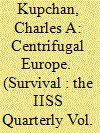

|
|
|
|
|
| Publication |
2012.
|
| Summary/Abstract |
The project of European integration is experiencing its gravest political crisis to date. Ongoing debate about how to restore the financial stability of the eurozone has exposed deep rifts within the EU, calling into question the solidarity that is the hallmark of political union. At stake is the survival not just of the euro, but the EU itself.
The EU's debt crisis poses a particularly potent threat to the project of European integration because it is both a consequence and a cause of a more serious malady: the renationalisation of European politics. Confronted with the powerful intrusions of both European integration and globalisation, electorates in EU member states have for the better part of a decade staged a mounting revolt against Brussels and its supranational brand of governance. Unwanted immigration, growing inequality, fraying welfare states, stagnant wages, bailout and austerity packages - these developments have produced a wave of popular discontent, which is in turn exacting a heavy toll on the EU as angry voters press for the repatriation of political control and the restoration of national autonomy.
|
|
|
|
|
|
|
|
|
|
|
|
|
|
|
|
| 2 |
ID:
158863
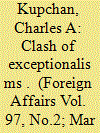

|
|
|
|
|
| Summary/Abstract |
Many Americans have recoiled at President Donald Trump’s “America first” foreign policy. [1] Critics charge that his populist brand of statecraft undermines the United States’ role [2]as an exceptional nation [2] destined to bring political and economic liberty to a waiting world. Trump exhibits isolationist, unilateralist, and protectionist instincts; indifference to the promotion of democracy; and animosity toward immigrants. How could Americans elect a president so at odds with what their country stands for?
|
|
|
|
|
|
|
|
|
|
|
|
|
|
|
|
| 3 |
ID:
080677


|
|
|
|
|
| Publication |
2007.
|
| Summary/Abstract |
According to mainstream opinion, the George W. Bush administration's assertive unilateralism represents a temporary departure from the traditional foreign policy of the United States, one that will be rectified by a change of personnel in the White House in 2009. This interpretation of recent trends in U.S. policy is illusory. The Bush administration's foreign policy, far from representing an aberration, marks the end of an era; it is a symptom, as much as a cause, of the unraveling of the liberal internationalist compact that guided the United States for more than half a century. The geopolitical and domestic conditions that gave rise to liberal internationalism have disappeared, eroding its bipartisan political foundations. In today's partisan landscape, the challenge is devising a grand strategy that not only meets the country's geopolitical needs but also is politically sustainable. A strategy that is as judicious and selective as it is purposeful offers the best hope for moving the United States toward a more stable and solvent political equilibrium
|
|
|
|
|
|
|
|
|
|
|
|
|
|
|
|
| 4 |
ID:
108938


|
|
|
| 5 |
ID:
093556


|
|
|
|
|
| Publication |
2010.
|
| Summary/Abstract |
During his first year in office, U.S. President Barack Obama made engagement with U.S. adversaries one of his administration's priorities. The historical record makes clear that Obama is on the right track: reaching out to adversaries is an essential start to rapprochement.
|
|
|
|
|
|
|
|
|
|
|
|
|
|
|
|
| 6 |
ID:
076408


|
|
|
| 7 |
ID:
073855
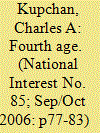

|
|
|
|
|
| Publication |
2006.
|
| Summary/Abstract |
Don't bother trying to recreate the Cold War-era transatlantic relationship-it is long gone.
|
|
|
|
|
|
|
|
|
|
|
|
|
|
|
|
| 8 |
ID:
078055


|
|
|
|
|
| Publication |
2007.
|
| Summary/Abstract |
Deep divisions at home about the nature of the United States' engagement with the world threaten to produce failed leadership abroad -- and possibly isolationism. To steady U.S. global leadership and restore consensus to U.S. foreign policy, U.S. commitments overseas must be scaled back to a more politically sustainable level
|
|
|
|
|
|
|
|
|
|
|
|
|
|
|
|
| 9 |
ID:
104724
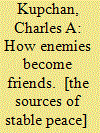

|
|
|
|
|
| Publication |
Princeton, Princeton University Press, 2010.
|
| Description |
xiii, 442p.
|
| Series |
Princeton studies in international history and politics
|
| Standard Number |
9780691142654, bhk
|
|
|
|
|
|
|
|
|
|
|
|
Copies: C:1/I:0,R:0,Q:0
Circulation
| Accession# | Call# | Current Location | Status | Policy | Location |
| 056037 | 303.66/KUP 056037 | Main | On Shelf | General | |
|
|
|
|
| 10 |
ID:
097756
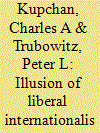

|
|
|
|
|
| Publication |
2010.
|
| Summary/Abstract |
Over the past two decades, political polarization has shaken the domestic foundations of U.S. grand strategy, sorely testing bipartisan support for liberal internationalism. Stephen Chaudoin, Helen Milner, and Dustin Tingley take issue with this interpretation, contending that liberal internationalism in the United States is alive and well. Their arguments, however, do not stand up to careful scrutiny. Their analysis of congressional voting and public opinion fails to demonstrate the persistence of bipartisanship on foreign policy. Indeed, the partisan gap that widened during George W. Bush's administration has continued during the presidency of Barack Obama, confirming that a structural change has taken place in the domestic bases of U.S. foreign policy. President Obama now faces the unenviable challenge of conducting U.S. statecraft during an era when consensus will be as elusive at home as it is globally.
|
|
|
|
|
|
|
|
|
|
|
|
|
|
|
|
| 11 |
ID:
065588
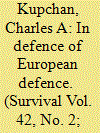

|
|
|
|
|
| Publication |
2000.
|
| Description |
p.16-32
|
|
|
|
|
|
|
|
|
|
|
|
|
|
|
|
| 12 |
ID:
066660


|
|
|
| 13 |
ID:
059002
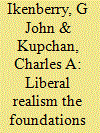

|
|
|
| 14 |
ID:
094729
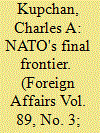

|
|
|
|
|
| Publication |
2010.
|
| Summary/Abstract |
NATO has traditionally treated Russia as a strategic pariah. But now, the West urgently needs Moscow's cooperation on a host of issues. A vision for turning Russia into a productive member of the Euro-Atlantic community is within reach: Russia should join NATO. Although NATO would run a strategic risk by admitting Russia, the Atlantic alliance is actually running a greater strategic risk by excluding it.
|
|
|
|
|
|
|
|
|
|
|
|
|
|
|
|
| 15 |
ID:
122501


|
|
|
|
|
| Publication |
New York, Oxford University Press, 2012.
|
| Description |
xii, 258p.Hbk
|
| Standard Number |
9780199739394
|
|
|
|
|
|
|
|
|
|
|
|
Copies: C:1/I:0,R:0,Q:0
Circulation
| Accession# | Call# | Current Location | Status | Policy | Location |
| 057376 | 303.482/KUP 057376 | Main | On Shelf | General | |
|
|
|
|
| 16 |
ID:
132390


|
|
|
|
|
| Publication |
2014.
|
| Summary/Abstract |
The ongoing reallocation of wealth and power from the West to the "rising rest" promises to produce a new pecking order over the course of the next few decades. Although there is a well-developed body of knowledge on the material dimensions of power transitions, existing scholarship provides a much more embryonic intellectual foundation on the normative dimensions of international change. Transitions in the international distribution of power produce not only novel hierarchies, but also novel brands of international order that rest on the social and ideological proclivities of newly powerful states in the system. This article explores the normative dimensions of hegemony by examining the geopolitical, socioeconomic, cultural, and commercial logics that inform different orders. The normative foundations of hegemony are studied across four great powers: the Ottoman Empire, Imperial China, Great Britain, and the United States. The cases reveal that as great powers rise, they as a matter of course seek to push outward to their expanding spheres of influence the norms that provide order within their own polities. Accordingly, today's emerging powers will not embrace the existing international order erected during the West's watch. On the contrary, China and other rising powers will seek to fashion alternative orders based on their own cultural, ideological, and socioeconomic trajectories. If the next international system is to be characterized by a rules-based order rather than competitive anarchy, it will require a new normative consensus that rests on toleration of ideological and political diversity.
|
|
|
|
|
|
|
|
|
|
|
|
|
|
|
|
| 17 |
ID:
029021


|
|
|
|
|
| Publication |
Boston, Allen and Unwin., 1987.
|
| Description |
xiv, 254p.
|
| Standard Number |
004497057
|
|
|
|
|
|
|
|
|
|
|
|
Copies: C:1/I:0,R:0,Q:0
Circulation
| Accession# | Call# | Current Location | Status | Policy | Location |
| 028551 | 355.033/KUP 028551 | Main | On Shelf | General | |
|
|
|
|
| 18 |
ID:
059134
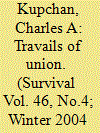

|
|
|
|
|
| Publication |
2004.
|
| Description |
p103-120
|
|
|
|
|
|
|
|
|
|
|
|
|
|
|
|
| 19 |
ID:
001713


|
|
|
|
|
| Publication |
Ithaca, Cornell University Press, 1994.
|
| Description |
xx, 527p.
|
| Standard Number |
0801481244
|
|
|
|
|
|
|
|
|
|
|
|
Copies: C:1/I:0,R:0,Q:0
Circulation
| Accession# | Call# | Current Location | Status | Policy | Location |
| 041300 | 355.03/KUP 041300 | Main | On Shelf | General | |
|
|
|
|
|
|
|
|
|